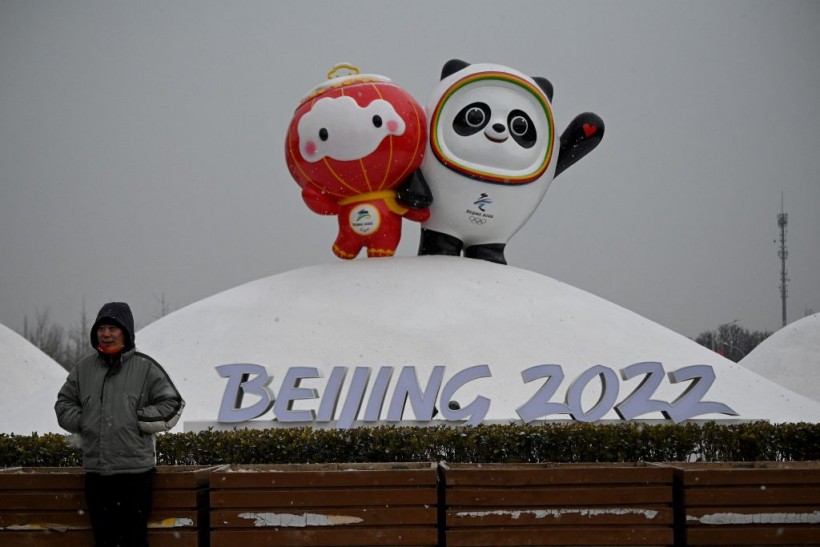
(Photo : NOEL CELIS/AFP via Getty Images)
A man poses for a picture in front of an installation displaying Bing Dwen Dwen (R) and Shuey Rhon Rhon, respective mascots of the 2022 Beijing Winter Olympic and Paralympic Games, two weeks before the start of the 2022 Beijing Winter Olympic Games, on a snowy day in Beijing on January 20, 2022.
Cybersecurity experts expressed concerns about the required Beijing Winter Olympics app for attendees and athletes to use after finding security weaknesses that could put users at risk of data breaches.
Athletes, audience members, and journalists must utilize the My2022 app to track Covid-19 on a daily basis. The app features voice chats, file transfers, and news about the Games, set to begin on February 4.
All guests to the Games are required to download the app 14 days before their departure for China and use it to track their Covid-19 status every day. At the same time, foreigners will be required to upload sensitive information like passport details and travel and medical histories.
Citizen Lab, a research institute at the University of Toronto's Munk School of Global Affairs and Public Policy, warned that the My2022 app does not provide encryption on many of its files, as per CBC.
The group also detected a "censorship keywords" list installed in the app and a feature that allows flagging other "politically sensitive" expressions.
The list of words includes the names of Chinese officials and government institutions, references to the 1989 Tiananmen Square massacre of pro-democracy demonstrators, and the blacklisted Chinese religious group Falun Gong,
According to experts, security flaws and features mentioned are common for apps in China. However, it could still put users at risk.
Read Also: Beijing On High Omicron Alert As Winter Olympics Approach; 'Zero-Tolerance' Policy Under Pressure
Sensitive Data At Risk
Cyber security firm Internet 2.0 has also warned of potential security risks during the Olympics. It pointed out some of the technology sponsors of the Beijing Olympics and their products that showcase the "sophisticated and broad surveillance culture" in China.
Among the products featured in the report was a VPN by Qi-Anxin that has the ability to capture a significant amount of user data. China's national security laws allow authorities to access such data, as per BBC.
The firm said that national data security laws in China do not offer the same level of protection as in Western nations as they are "not designed" with "values of privacy and liberty."
Due to the reported online security threats, Team USA was advised to use burner phones and rental or disposable computers for its personnel and athletes.
"Like computers, the data and applications on cell phones are subject to malicious intrusion, infection, and data compromise," the organization's bulletin said.
Limited Olympic Torch Relay
Meanwhile, organizers of the Winter Olympics have announced on Friday that the traditional torch relay for the Winter Olympics in Beijing will be limited to three days due to concerns about the COVID-19 outbreak, as per NPR report.
The symbolic Olympic flame will only be displayed in an enclosed and safe environment. This also means that public transportation will not be disrupted, with around 20 million residents in the city.
The torch relay will be held from February 2 to 4 in three competition areas located In Yanqinq and Zhangjiakou.
According to Yang Haibin, deputy sports director, organizers had considered venue preparations, the probability of forest fires, and pandemic policies.
China also announced that only athletes selected audiences, staff, and press members will be allowed to attend the Games. They must also stay within the bubble that will serve as a barrier from the general public to lessen the risk of virus transmission.
Related Article: Biden Administration Considers Boycotting Beijing Olympics After Lawmakers Warn Against Security Risks, China's Human Rights Abuses








